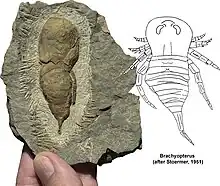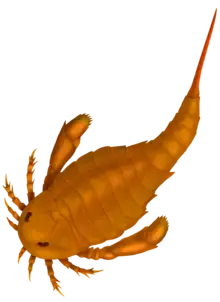| Brachyopterus Temporal range: Middle Ordovician, | |
|---|---|
 | |
| Reconstruction of Brachyopterus stubblefieldi | |
| Scientific classification | |
| Domain: | Eukaryota |
| Kingdom: | Animalia |
| Phylum: | Arthropoda |
| Subphylum: | Chelicerata |
| Order: | †Eurypterida |
| Superfamily: | †Rhenopteroidea |
| Family: | †Rhenopteridae |
| Genus: | †Brachyopterus Størmer, 1951 |
| Type species | |
| †Brachyopterus stubblefieldi Størmer, 1951 | |

Brachyopterus is a genus of prehistoric eurypterid of the family Rhenopteridae. It is one of the earliest known eurypterids,[1] having been recovered from Middle Ordovician deposits in Montgomeryshire, Wales.[2] Though other species have been assigned to it in the past, Brachyopterus is today recognized as containing one valid species, B. stubblefieldi.[2]

Description

Brachyopterus is distinguished by its small size, compound eyes with axes converging anteriorly on a subtrapezoid to subpentagonal prosoma (head). All of its legs are walking legs; the first three pairs are short with spines, except when modified into clasping organs; the last two pairs are moderately long, keeled and tapering in width to terminal claws. The last leg falls short of the penultimate abdominal segment. The abdomen is narrow and ends in a short styliform telson. Brachyopterus date from the Middle Ordovician.[3]
Classification
Kjellesvig-Waering (1966) concluded that "there is no other genus that warrants comparison, or, indeed at our present state of knowledge, reveals any close affinities with this very unusual genus", though the genus was able to be classified as a stylonurine.[4] In later years, further similarities have been noted between Brachyopterus and the rhenopterids. Lamsdell et al. (2010) classified it as the most basal of the rhenopterids and a sister taxon to more derived rhenopterids (such as Kiaeropterus and Rhenopterus).[5]
See also
References
- ↑ James C. Lamsdell, Simon J. Braddy & O. Erik Tetlie (2010). "The systematics and phylogeny of the Stylonurina (Arthropoda: Chelicerata: Eurypterida)". Journal of Systematic Palaeontology. 8 (1): 49–61. doi:10.1080/14772011003603564.
- 1 2 Dunlop, J. A., Penney, D. & Jekel, D. 2015. A summary list of fossil spiders and their relatives. In World Spider Catalog. Natural History Museum Bern, online at http://wsc.nmbe.ch , version 16.0 http://www.wsc.nmbe.ch/resources/fossils/Fossils16.0.pdf (PDF).
- ↑ Størmer, L. 1955. Merostomata. Treatise on Invertebrate Paleontology, Part P Arthropoda 2, Chelicerata, pp. 36–37.
- ↑ "Page:A Revision of the Families and Genera of the Stylonuracea (Eurypterida).djvu/17 - Wikisource, the free online library". en.wikisource.org. Retrieved 2017-12-14.
- ↑ James C. Lamsdell, Simon J. Braddy & O. Erik Tetlie (2010). "The systematics and phylogeny of the Stylonurina (Arthropoda: Chelicerata: Eurypterida)". Journal of Systematic Palaeontology. 8 (1): 49–61. doi:10.1080/14772011003603564. S2CID 85398946.
